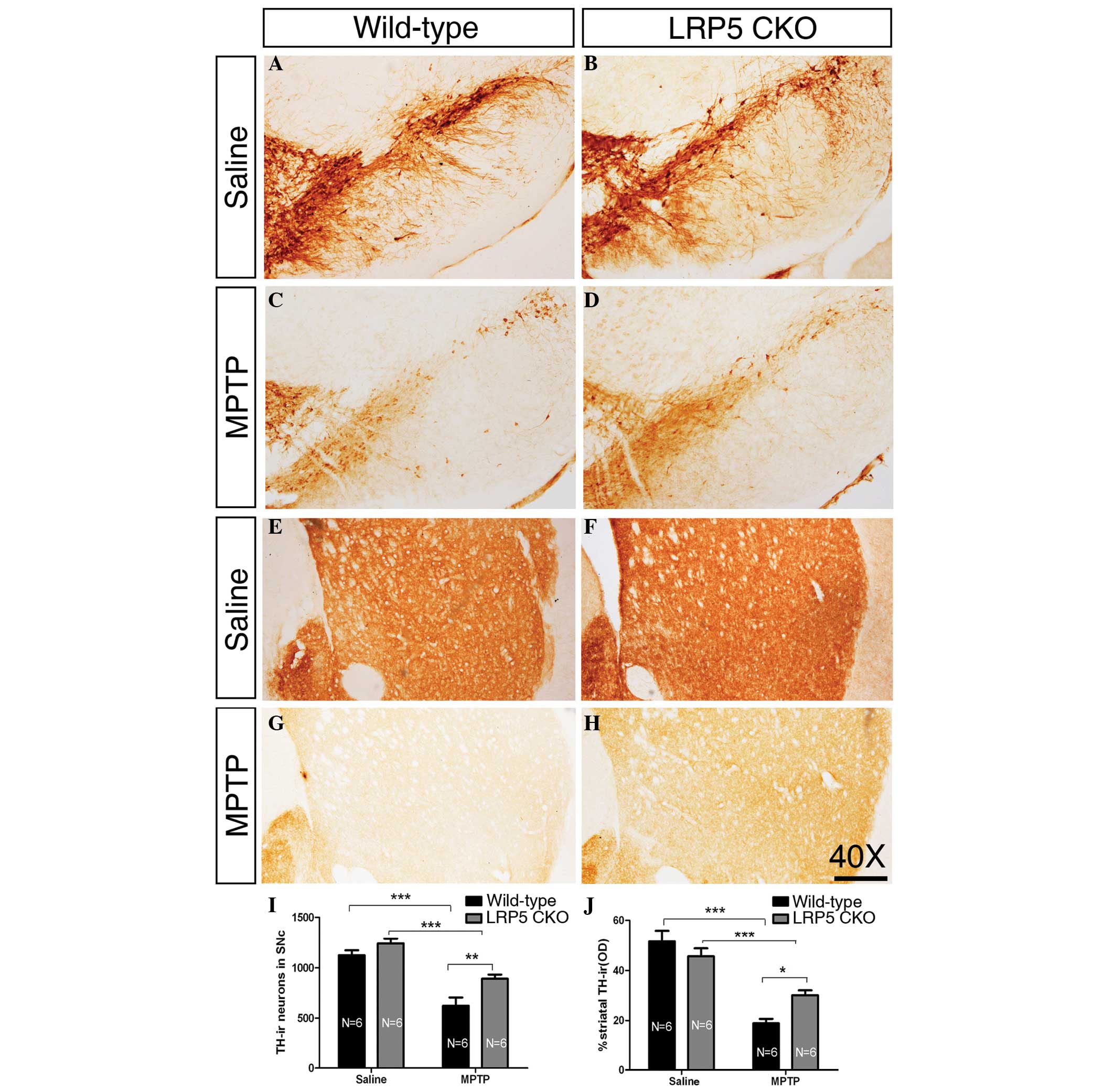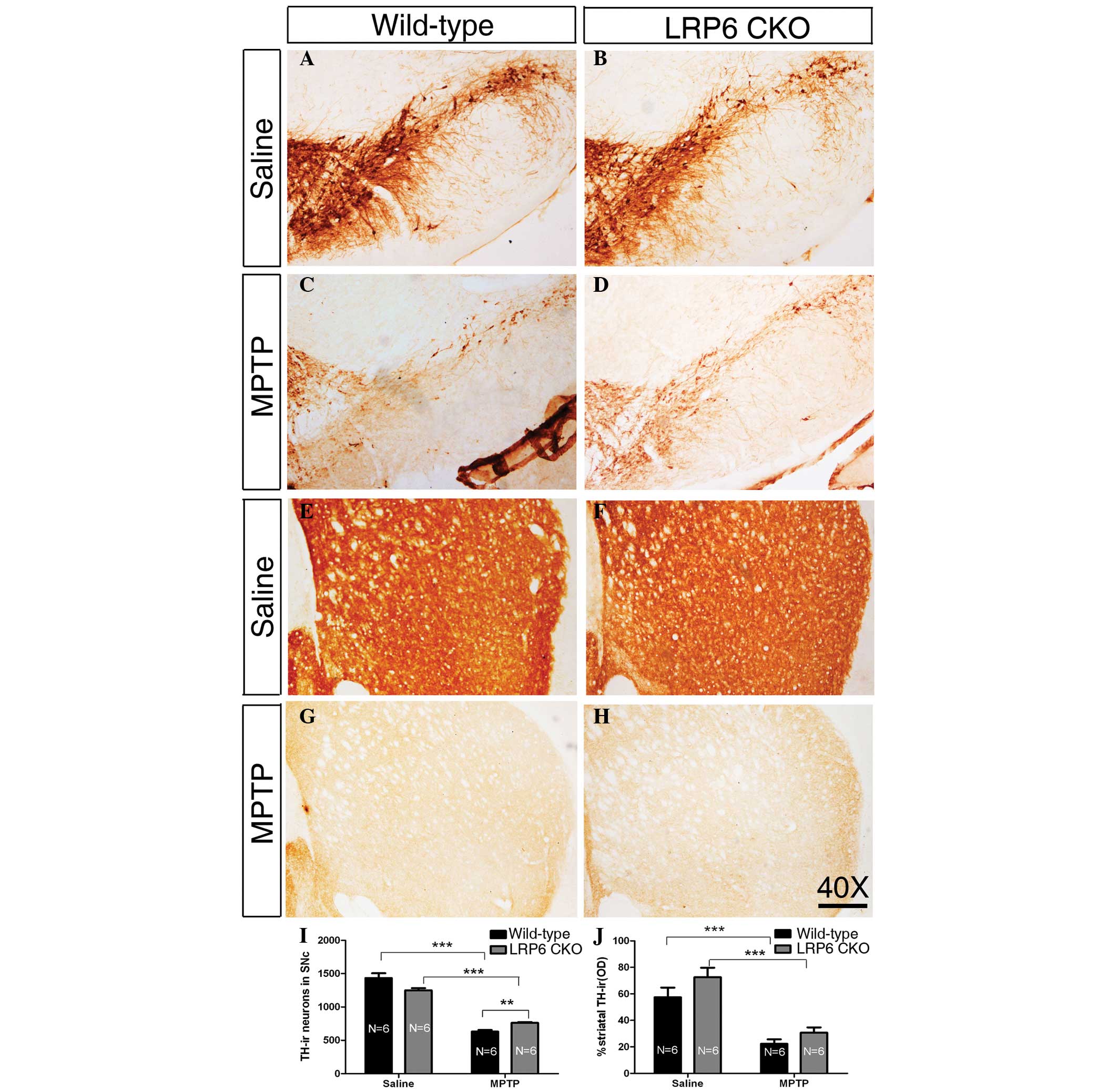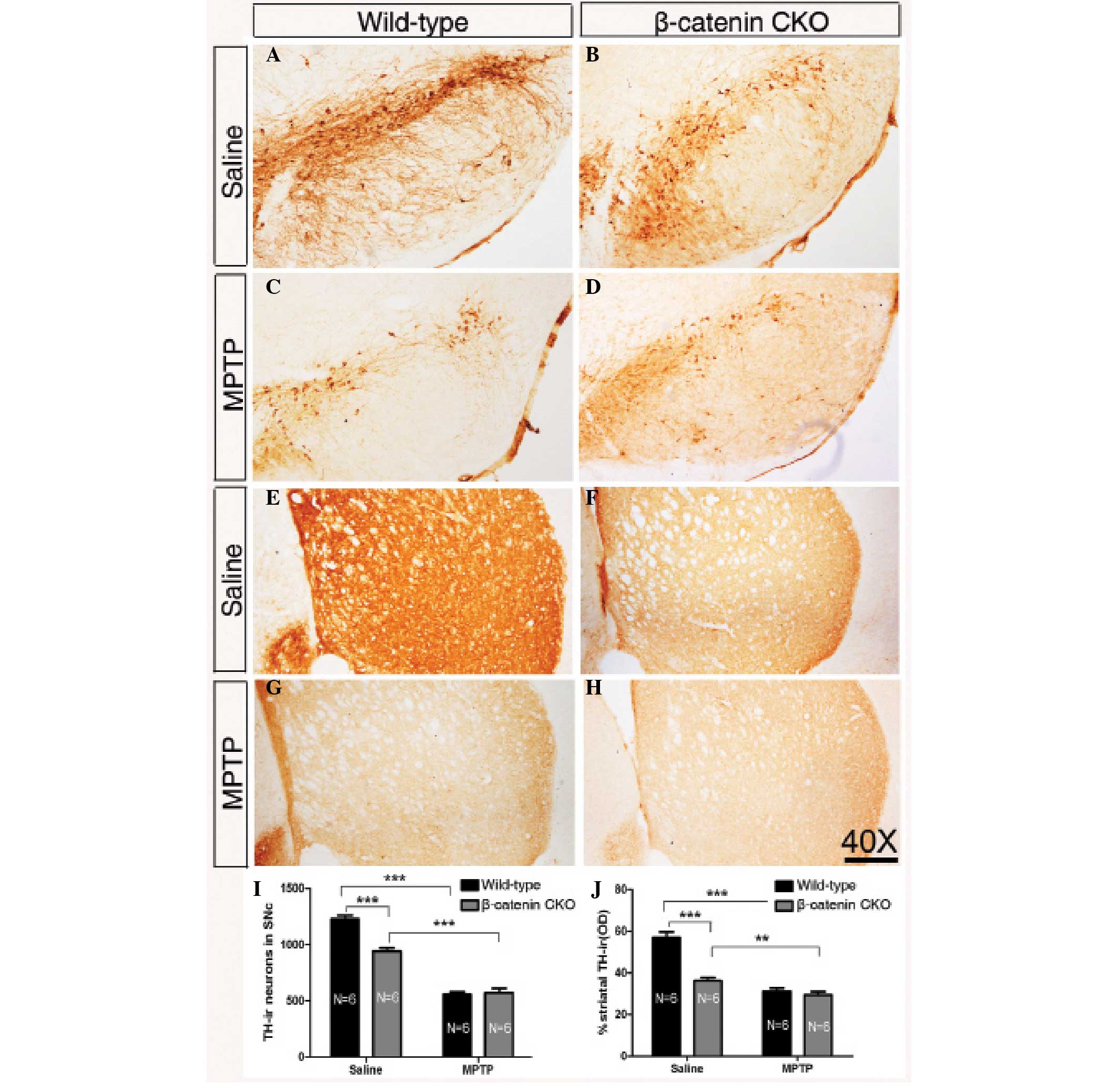|
1
|
Logan CY and Nusse R: The Wnt signaling
pathway in development and disease. Annu Rev Cell Dev Biol.
20:781–810. 2004. View Article : Google Scholar : PubMed/NCBI
|
|
2
|
Pinson KI, Brennan J, Monkley S, Avery BJ
and Skarnes WC: An LDL-receptor-related protein mediates Wnt
signalling in mice. Nature. 407:535–538. 2000. View Article : Google Scholar : PubMed/NCBI
|
|
3
|
Tamai K, Semenov M, Kato Y, et al:
LDL-receptor-related proteins in Wnt signal transduction. Nature.
407:530–535. 2000. View
Article : Google Scholar : PubMed/NCBI
|
|
4
|
Wehrli M, Dougan ST, Caldwell K, et al:
arrow encodes an LDL-receptor-related protein essential for
Wingless signalling. Nature. 407:527–530. 2000. View Article : Google Scholar : PubMed/NCBI
|
|
5
|
He X, Semenov M, Tamai K and Zeng X: LDL
receptor-related proteins 5 and 6 in Wnt/beta-catenin signaling:
arrows point the way. Development. 131:1663–1677. 2004. View Article : Google Scholar : PubMed/NCBI
|
|
6
|
Tolwinski NS and Wieschaus E: A nuclear
function for armadillo/beta-catenin. PLoS Biol. 2:E952004.
View Article : Google Scholar : PubMed/NCBI
|
|
7
|
MacDonald BT, Tamai K and He X:
Wnt/beta-catenin signaling: components, mechanisms, and diseases.
Dev Cell. 17:9–26. 2009. View Article : Google Scholar : PubMed/NCBI
|
|
8
|
Toledo EM, Colombres M and Inestrosa NC:
Wnt signaling in neuroprotection and stem cell differentiation.
Prog Neurobiol. 86:281–296. 2008. View Article : Google Scholar : PubMed/NCBI
|
|
9
|
Inestrosa NC and Arenas E: Emerging roles
of Wnts in the adult nervous system. Nat Rev Neurosci. 11:77–86.
2010. View
Article : Google Scholar : PubMed/NCBI
|
|
10
|
Thomas KR and Capecchi MR: Targeted
disruption of the murine int-1 proto-oncogene resulting in severe
abnormalities in midbrain and cerebellar development. Nature.
346:847–850. 1990. View
Article : Google Scholar : PubMed/NCBI
|
|
11
|
Castelo-Branco G, Wagner J, Rodriguez FJ,
et al: Differential regulation of midbrain dopaminergic neuron
development by Wnt-1, Wnt-3a, and Wnt-5a. Proc Natl Acad Sci USA.
100:12747–12752. 2003. View Article : Google Scholar : PubMed/NCBI
|
|
12
|
Castelo-Branco G, Andersson ER, Minina E,
et al: Delayed dopaminergic neuron differentiation in Lrp6 mutant
mice. Dev Dyn. 239:211–221. 2010.PubMed/NCBI
|
|
13
|
Tang M, Miyamoto Y and Huang EJ: Multiple
roles of beta-catenin in controlling the neurogenic niche for
midbrain dopamine neurons. Development. 136:2027–2038. 2009.
View Article : Google Scholar : PubMed/NCBI
|
|
14
|
Berwick DC and Harvey K: The importance of
Wnt signalling for neurodegeneration in Parkinson’s disease.
Biochem Soc Trans. 40:1123–1128. 2012.PubMed/NCBI
|
|
15
|
Rawal N, Corti O, Sacchetti P, et al:
Parkin protects dopaminergic neurons from excessive
Wnt/beta-catenin signaling. Biochem Biophys Res Commun.
388:473–478. 2009. View Article : Google Scholar : PubMed/NCBI
|
|
16
|
Dun Y, Li G, Yang Y, et al: Inhibition of
the canonical Wnt pathway by Dickkopf-1 contributes to the
neurodegeneration in 6-OHDA-lesioned rats. Neurosci Lett.
525:83–88. 2012. View Article : Google Scholar : PubMed/NCBI
|
|
17
|
L’Episcopo F, Tirolo C, Testa N, et al:
Reactive astrocytes and Wnt/beta-catenin signaling link
nigrostriatal injury to repair in
1-methyl-4-phenyl-1,2,3,6-tetrahydropyridine model of Parkinson’s
disease. Neurobiol Dis. 41:508–527. 2011.PubMed/NCBI
|
|
18
|
Gelman DM, Noain D, Avale ME, Otero V, Low
MJ and Rubinstein M: Transgenic mice engineered to target
Cre/loxP-mediated DNA recombination into catecholaminergic neurons.
Genesis. 36:196–202. 2003. View Article : Google Scholar : PubMed/NCBI
|
|
19
|
Zhong Z, Baker JJ, Zylstra-Diegel CR and
Williams BO: Lrp5 and Lrp6 play compensatory roles in mouse
intestinal development. J Cell Biochem. 113:31–38. 2012. View Article : Google Scholar : PubMed/NCBI
|
|
20
|
Joeng KS, Schumacher CA, Zylstra-Diegel
CR, Long F and Williams BO: Lrp5 and Lrp6 redundantly control
skeletal development in the mouse embryo. Dev Biol. 359:222–229.
2011. View Article : Google Scholar : PubMed/NCBI
|
|
21
|
Brault V, Moore R, Kutsch S, et al:
Inactivation of the beta-catenin gene by Wnt1-Cre-mediated deletion
results in dramatic brain malformation and failure of craniofacial
development. Development. 128:1253–1264. 2001.PubMed/NCBI
|
|
22
|
Bezard E, Dovero S, Bioulac B and Gross
CE: Kinetics of nigral degeneration in a chronic model of
MPTP-treated mice. Neurosci Lett. 234:47–50. 1997. View Article : Google Scholar : PubMed/NCBI
|
|
23
|
Alvarez-Fischer D, Fuchs J, Castagner F,
et al: Engrailed protects mouse midbrain dopaminergic neurons
against mitochondrial complex I insults. Nat Neurosci.
14:1260–1266. 2011. View
Article : Google Scholar : PubMed/NCBI
|
|
24
|
Fornai F, Schlüter OM, Lenzi P, et al:
Parkinson-like syndrome induced by continuous MPTP infusion:
convergent roles of the ubiquitin-proteasome system and
alpha-synuclein. Proc Natl Acad Sci USA. 102:3413–3418. 2005.
View Article : Google Scholar : PubMed/NCBI
|
|
25
|
Paxinos G and Franklin KBJ: The Mouse
Brain in Stereotaxic Coordinates. 2nd edition. Academic Press; San
Diego: 2001
|
|
26
|
Li Y and Bu G: LRP5/6 in Wnt signaling and
tumorigenesis. Future Oncol. 1:673–681. 2005. View Article : Google Scholar : PubMed/NCBI
|
|
27
|
Joiner DM, Ke J, Zhong Z, Xu HE and
Williams BO: LRP5 and LRP6 in development and disease. Trends
Endocrinol Metab. 24:31–39. 2013. View Article : Google Scholar : PubMed/NCBI
|
|
28
|
MacDonald BT and He X: Frizzled and LRP5/6
receptors for Wnt/β-catenin signaling. Cold Spring Harb Perspect
Biol. 4:a0078802012.
|
|
29
|
Joksimovic M and Awatramani R:
Wnt/beta-catenin signaling in midbrain dopaminergic neuron
specification and neurogenesis. J Mol Cell Biol. 6:27–33. 2014.
View Article : Google Scholar : PubMed/NCBI
|
|
30
|
Joksimovic M, Yun BA, Kittappa R, et al:
Wnt antagonism of Shh facilitates midbrain floor plate
neurogenesis. Nat Neurosci. 12:125–131. 2009. View Article : Google Scholar : PubMed/NCBI
|
|
31
|
Terzioglu M and Galter D: Parkinson’s
disease: genetic versus toxin-induced rodent models. FEBS J.
275:1384–1391. 2008.
|
|
32
|
Petroske E, Meredith GE, Callen S,
Totterdell S and Lau YS: Mouse model of Parkinsonism: a comparison
between subacute MPTP and chronic MPTP/probenecid treatment.
Neuroscience. 106:589–601. 2001. View Article : Google Scholar : PubMed/NCBI
|
|
33
|
L’Episcopo F, Serapide MF, Tirolo C, et
al: A Wnt1 regulated Frizzled-1/β-Catenin signaling pathway as a
candidate regulatory circuit controlling mesencephalic dopaminergic
neuron-astrocyte crosstalk: Therapeutical relevance for neuron
survival and neuroprotection. Mol Neurodegener. 6:492011.
|
|
34
|
Feil R, Brocard J, Mascrez B, LeMeur M,
Metzger D and Chambon P: Ligand-activated site-specific
recombination in mice. Proc Natl Acad Sci U S A. 93:10887–10890.
1996. View Article : Google Scholar : PubMed/NCBI
|

















